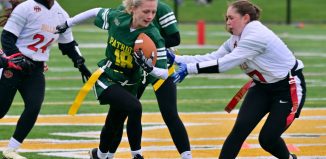By Elof Carlson
My mother was a paranoid schizophrenic.
She had been married before in a traditional Jewish arranged marriage to her father’s business acquaintance. He told his daughter, “Ida, this is Max. He will be your husband.” She had two children with her husband, my half-brother Ben and my half-sister Sadie. The marriage failed and eventually they separated, and the children were placed in a Hebrew orphan asylum in New York City.
My mother tried to get her children back, but when she stormed the desk of a charity worker she was instead committed as insane to Pilgrim State Hospital. After three months she was released, and one winter day in Manhattan as she sold key rings on the streets, she tried to warm up in a hotel lobby. The doorman told her to warm up downstairs in the employee’s room. There she met my father, a Swedish-born, lapsed Lutheran, merchant mariner who settled in New York City. He took her to dinner and they began a courtship.
Max obtained a divorce and my parents were married in New Jersey. A year later, my brother Roland was born and a year and a half later, in 1931, I was born.
I began to realize my mother was different when I was about 5 years old. She would get hysterical. She had fights with our father. When she got angry at our behavior, she would smash dishes on the floor and we would scoot under the bed. I got used to meals left half-eaten at restaurants or movies whose ending I did not get to see when she would leave, because she thought people were staring at her or talking about her.
But I also realized she was very protective. My brother was born with a congenital heart condition. She made sure he did not exert himself and took us to the parks to play rather than to play with neighborhood children. She took us to art shops and museums, or cooled us off during heat waves by going back and forth on the Staten Island Ferry.
She took us to bookstores and shared with our father, an elevator operator, the importance of learning and the arts. Every day she would take her violin and play for us for an hour, especially the music of Stephen Foster, Fritz Kreisler and other light classical selections. When we were teenagers, she began going out in the evening and playing as a street musician.
I think my father stayed in a bad marriage because he did not want to see his two children also ending up in an orphan asylum or foster home.
I learned from my mother that she was not insane all the time. She had her good days and I never doubted her love for us. She encouraged our efforts at art and praised our passion for reading. I also admired her ability to do a lot with very little money.
She liked to visit her daughter in California and would get a one-way ticket by train, get off during a rest stop, play her violin for donations from passengers and continue on until she got to California. She only took a sneaker bag for her clothes and her violin case as luggage. It taught me how creative I could be when I lacked the traditional ways to do things.
When I was at Tougaloo College teaching in an all-black school, I found the library had no books or journals on human genetics. So I called the medical school in Jackson, Mississippi, and arranged to bring four students at a time in my car to its library. I taught the students how to use the “Index Medicus” to select articles. We read together taking notes at the library table. I learned about my students’ lives during the car trip to or back from the library.
I would not have improvised had it not been what I learned from my mother.
Elof Axel Carlson is a distinguished teaching professor emeritus in the Department of Biochemistry and Cell Biology at Stony Brook University.






